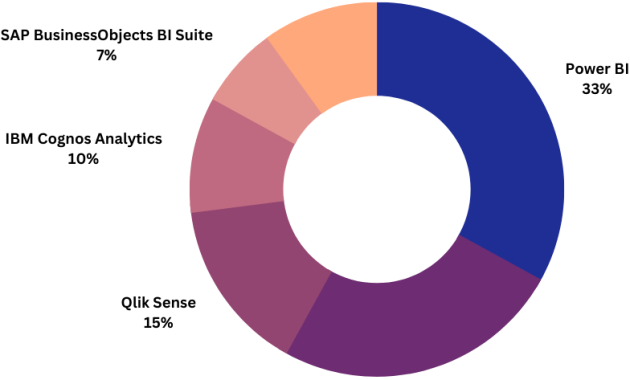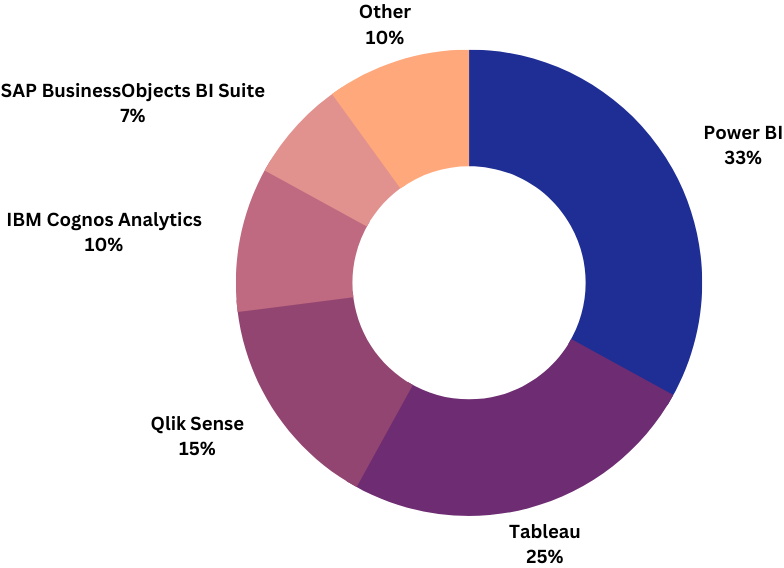
Mastering 15 Business Intelligence Tools: A Comprehensive Guide for Data-Driven Decisions
In today’s fast-paced business environment, data is king. Companies of all sizes are drowning in information, but the real challenge lies in extracting valuable insights from this ocean of data. This is where business intelligence (BI) tools come into play. They empower organizations to analyze data, identify trends, and make informed decisions. This article provides a comprehensive guide to mastering 15 essential business intelligence tools, equipping you with the knowledge to transform raw data into actionable strategies. This guide is a must-read for professionals looking to leverage the power of data.
The ability to effectively use business intelligence tools is no longer a luxury but a necessity. It’s about understanding your customers, optimizing operations, and staying ahead of the competition. This guide will help you navigate the landscape of BI tools, providing insights into their capabilities and how they can benefit your business.
Understanding the Importance of Business Intelligence
Business intelligence is more than just reporting; it’s about understanding the “why” behind the numbers. It involves collecting, processing, analyzing, and visualizing data to uncover patterns, trends, and anomalies. This understanding allows businesses to:
- Improve decision-making
- Optimize operational efficiency
- Identify new market opportunities
- Enhance customer experience
- Gain a competitive advantage
The right business intelligence tools will provide you with the insights you need to succeed. They transform complex data into easy-to-understand dashboards and reports.
Top Business Intelligence Tools to Master
The following is a curated list of 15 leading business intelligence tools, categorized for easier understanding. Each tool offers unique features and capabilities, catering to different business needs. The selection is based on market presence, user reviews, and overall effectiveness.
Data Visualization and Reporting Tools
These tools excel at transforming data into visually appealing and easy-to-understand reports and dashboards.
- Tableau: A widely-used tool known for its intuitive interface and powerful data visualization capabilities. It allows users to create interactive dashboards and share insights across the organization.
- Microsoft Power BI: A robust and affordable option, seamlessly integrating with other Microsoft products. It offers a wide range of data connectors and visualization options. [See also: Power BI vs. Tableau: Which is right for you?]
- Qlik Sense: Known for its associative data modeling engine, allowing users to explore data in a flexible and intuitive way. It emphasizes data discovery and collaboration.
- Looker (Google Cloud): A powerful platform that focuses on data modeling and collaboration. It allows for creating complex data models and sharing insights across teams.
Data Integration and ETL Tools
These tools are crucial for collecting, cleaning, and preparing data from various sources.
- Informatica PowerCenter: A leading ETL (Extract, Transform, Load) tool designed for complex data integration tasks. It excels in handling large volumes of data.
- Talend: An open-source data integration platform offering a comprehensive suite of tools for ETL processes. It is a cost-effective option for many businesses.
- Apache NiFi: A data flow system for processing and distributing data. It is particularly useful for real-time data streaming and integration.
Advanced Analytics and Data Mining Tools
These tools provide advanced analytical capabilities, including statistical analysis, predictive modeling, and data mining.
- SAS: A comprehensive suite of statistical software used for advanced analytics and data mining. It’s often favored by large enterprises.
- IBM SPSS Statistics: A powerful statistical software package used for analyzing data. It is suitable for both beginners and experienced analysts.
- RapidMiner: A user-friendly platform for data science and machine learning. It offers a visual interface for building and deploying predictive models.
Business Performance Management Tools
These tools focus on aligning business strategy with execution, providing a holistic view of organizational performance.
- Oracle Hyperion: A comprehensive platform for financial planning, budgeting, and forecasting. It’s often used by larger organizations.
- Board International: A unified platform for business intelligence, planning, and analytics. It is known for its ease of use and flexibility.
- Adaptive Insights (Workday): A cloud-based platform for financial planning and analysis. It offers strong collaboration and reporting features.
Open-Source and Specialized Tools
These tools offer unique features and cater to specific needs or offer open-source alternatives.
- Metabase: An open-source BI tool that offers a simple and intuitive interface for data visualization and reporting. It is an excellent option for smaller teams.
- Sisense: A BI tool known for its ability to handle large datasets and complex analyses. It is often used by companies with demanding data needs.
Choosing the Right Business Intelligence Tool
Selecting the right business intelligence tool is crucial for success. Consider these factors:
- Business Needs: Identify your specific requirements. Do you need data visualization, data integration, or advanced analytics?
- Data Sources: Determine the data sources you need to connect to. Ensure the tool supports your data sources.
- User Skills: Consider the skill level of your team. Some tools are easier to use than others.
- Budget: Evaluate the cost of the tool, including licensing fees, implementation costs, and training.
- Scalability: Choose a tool that can scale with your business as your data volume grows.
Carefully evaluate your options before making a decision. The right tool can unlock significant value from your data.
Implementing Business Intelligence Tools Effectively
Once you have chosen your business intelligence tool, successful implementation requires careful planning. Consider these steps:
- Define Objectives: Clearly define your business goals and how the tool will help achieve them.
- Data Preparation: Clean and prepare your data to ensure accuracy and consistency.
- User Training: Provide adequate training to your team to ensure they can use the tool effectively.
- Data Governance: Establish data governance policies to maintain data quality and security.
- Monitor and Evaluate: Continuously monitor the tool’s performance and evaluate its impact on your business.
Effective implementation is key to realizing the full potential of your business intelligence tool investment. This is how you fully leverage the power of business intelligence.
The Future of Business Intelligence
The field of business intelligence is constantly evolving. Emerging trends include:
- Artificial Intelligence (AI) and Machine Learning (ML): AI and ML are being integrated into BI tools to automate analysis, provide predictive insights, and improve decision-making.
- Cloud-Based BI: Cloud-based BI tools are becoming increasingly popular due to their scalability, accessibility, and cost-effectiveness.
- Data Democratization: The trend towards making data accessible to everyone in the organization, empowering them to make data-driven decisions.
- Self-Service BI: Tools that allow business users to perform their own data analysis without relying on IT departments.
Staying informed about these trends is crucial for businesses that want to remain competitive. The future of business intelligence will be driven by these advancements.
Conclusion: Harnessing the Power of Business Intelligence
Mastering business intelligence tools is essential for any organization seeking to thrive in today’s data-driven world. By understanding the capabilities of these tools and implementing them effectively, businesses can unlock valuable insights, optimize operations, and make more informed decisions. This guide has provided a comprehensive overview of 15 essential business intelligence tools, equipping you with the knowledge to embark on your data-driven journey. The insights gained from these business intelligence tools will revolutionize your business. Embrace the power of business intelligence and transform your data into a strategic asset.
By investing in the right tools and strategies, businesses can unlock the full potential of their data and achieve sustainable success. Remember that the most effective business intelligence tools are those that align with your specific needs. Now go forth and use these business intelligence tools!

